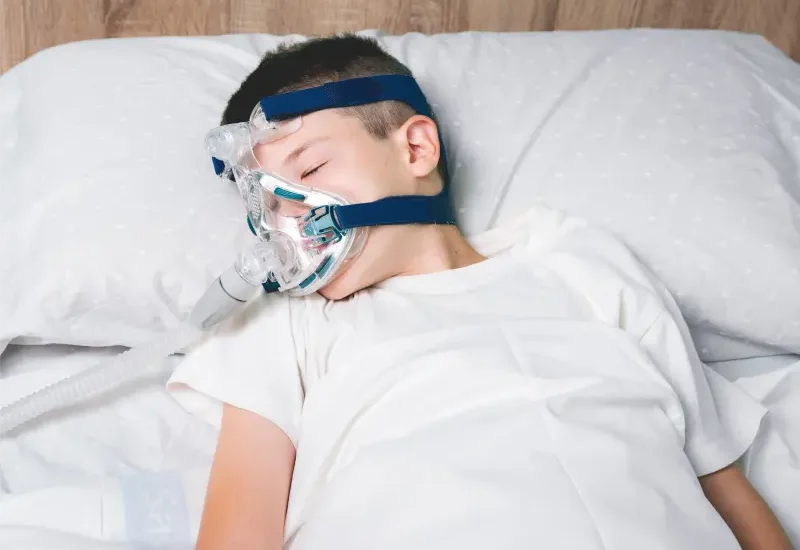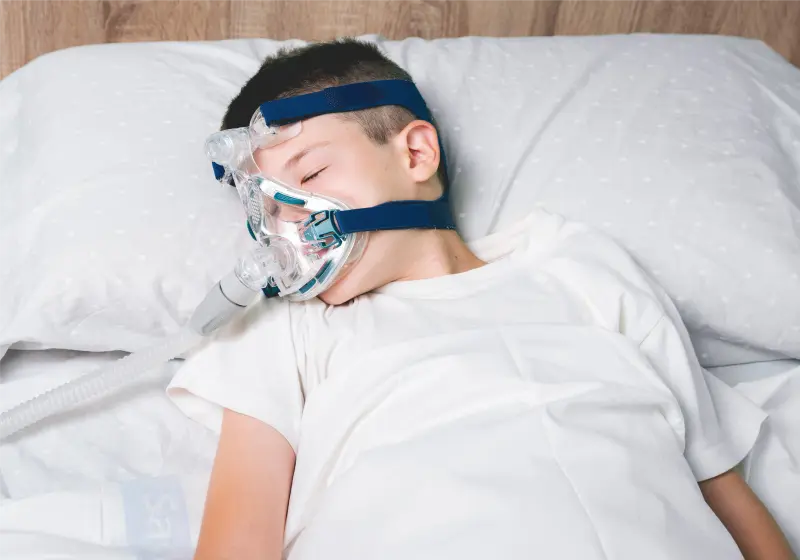- Mitchell
- 0 Comments
The CPAP machine is a commonly used, and well known, device for the treatment of sleep apnea. However, BiPAP machines are also lesser-known sleep apnea treatment devices that provide a similar but also quite different form of treatment. BiPAP vs CPAP is an important distinction you need to understand when you and your doctor decide how best to treat your sleep apnea.
What Is CPAP and How Does It Work?
CPAP is a type of pap machine and stands for Continuous Positive Airway Pressure. This means that a CPAP machine provides the same amount of positive airway pressure through the mask during the use of the machine. This mild airway pressure is used to keep your airways open while you sleep. Indication of CPAP need is normally for people with sleep apnea or other serious respiratory sleep disorders, not just simple snoring issues.
CPAP devices work by placing a mask over your mouth which is connected by a hose to a small machine that sits beside your bed. This machine pumps air into the hose and through the mask into your airways, helping to keep your airways open while you sleep. This helps to treat sleep apnea and keeps you breathing throughout the night. However, many people find the CPAP mask and hose to be uncomfortable and it can make it difficult to sleep. This is why many people look for some sort of alternative.
CPAP devices work by placing a mask over your mouth which is connected by a hose to a small machine that sits beside your bed. This machine pumps air into the hose and through the mask into your airways, helping to keep your airways open while you sleep. This helps to treat sleep apnea and keeps you breathing throughout the night. However, many people find the CPAP mask and hose to be uncomfortable and it can make it difficult to sleep. This is why many people look for some sort of alternative.

Benefits of CPAP
CPAP devices offer many benefits to those people suffering from CPAP. CPAP machines enhance your sleep quality by enabling respiratory support throughout the night that allows you to have uninterrupted, higher quality sleep. Sleep apnea can block your breathing and cause you to wake up multiple times during the night, sometimes without you even noticing, however, CPAP therapy can prevent these interruptions in breathing and keep you asleep.
This increase in sleep quality due to breathing assistance can have other benefits including increased energy and alertness. With this sleep treatment, you will feel more rested and ready to start the day. This can also lead to a better mood and performance, both mentally and physically. Additional benefits of CPAP machines can include less snoring and reduced acid reflux.
This increase in sleep quality due to breathing assistance can have other benefits including increased energy and alertness. With this sleep treatment, you will feel more rested and ready to start the day. This can also lead to a better mood and performance, both mentally and physically. Additional benefits of CPAP machines can include less snoring and reduced acid reflux.
What Is BiPAP and How Does It Work?
BiPAP therapy consists of different types of ventilation machines that provide respiratory support. BiPAP stands for Bilevel Positive Airway Pressure, and this means that it gives you airflow at two different pressures, unlike CPAP which is just a continuously the same pressure. BiPAP machines provide a different level of pressure for when you are inhaling than when you are exhaling.
BiPAP ventilation works in a somewhat similar way to CPAP as it has a mask and a hose attached to a machine that provides airflow while you are asleep. However, the major difference is that different levels of air pressure are provided depending on if you are exhaling or inhaling, more when you breathe in and less when you breathe out. The BiPAP respiratory equipment pressure can be adjusted based on timing or can automatically adjust to your breathing patterns.
BiPAP ventilation works in a somewhat similar way to CPAP as it has a mask and a hose attached to a machine that provides airflow while you are asleep. However, the major difference is that different levels of air pressure are provided depending on if you are exhaling or inhaling, more when you breathe in and less when you breathe out. The BiPAP respiratory equipment pressure can be adjusted based on timing or can automatically adjust to your breathing patterns.
Benefits of BiPAP
BiPAP therapy offers many of the same benefits for respiratory health as CPAP does including helping you breathe during the night and preventing you from constantly waking up from interruptions in breathing. This increase in sleep quality will leave you feeling more rested and have more energy the next day to be able to perform better both physically and mentally.
BiPAP can offer some different benefits than CPAP if you have trouble exhaling because the amount of pressure administered while breathing out is less. This can make it more effective for some people than CPAP. Not being able to exhale properly is one of the key BiPAP indications that you need to use a BiPAP machine for breathing support.
BiPAP can offer some different benefits than CPAP if you have trouble exhaling because the amount of pressure administered while breathing out is less. This can make it more effective for some people than CPAP. Not being able to exhale properly is one of the key BiPAP indications that you need to use a BiPAP machine for breathing support.
Is CPAP or BiPAP Better for Sleep Apnea?
There is not one answer for which is better, CPAP or BiPAP as it depends on what you and your doctor decide that you need for your respiratory health. CPAP machines for sleep therapy are often much cheaper than BiPAP machines so if you don’t need the differing amounts of pressure, they may be the better options. CPAP machines are most often used to treat mild to moderate obstructive sleep apnea.
Bipap For Sleep Apnea is best for people who have trouble exhaling when they use CPAP machines or have complex sleep-related breathing issues such as severe obstructive sleep apnea or hypercapnic respiratory failure.
There may be a chance that you do not need either CPAP or BiPAP if you suffer from positional sleep apnea. Certain positional sleep apnea devices hold you in place while you sleep and help to keep your airways open, allowing you to breathe throughout the night. One of these devices is Zzoma which is designed to help you sleep comfortably with positional sleep apnea. Talk to your doctorabout Zzoma for sleep therapy today.
Bipap For Sleep Apnea is best for people who have trouble exhaling when they use CPAP machines or have complex sleep-related breathing issues such as severe obstructive sleep apnea or hypercapnic respiratory failure.
There may be a chance that you do not need either CPAP or BiPAP if you suffer from positional sleep apnea. Certain positional sleep apnea devices hold you in place while you sleep and help to keep your airways open, allowing you to breathe throughout the night. One of these devices is Zzoma which is designed to help you sleep comfortably with positional sleep apnea. Talk to your doctorabout Zzoma for sleep therapy today.
